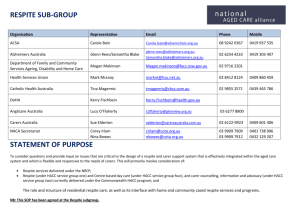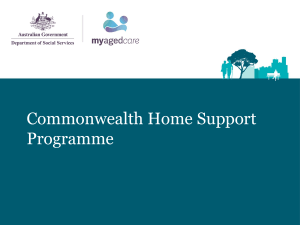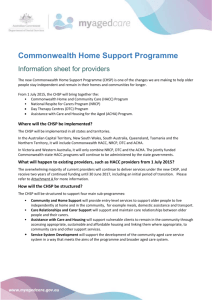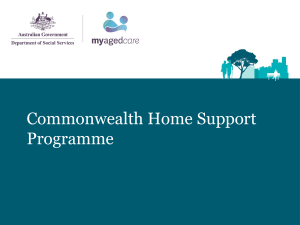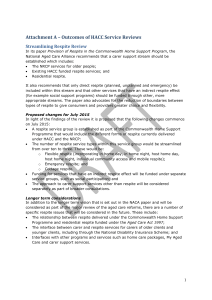Aged care reform and the CHSP - Department of Social Services
advertisement
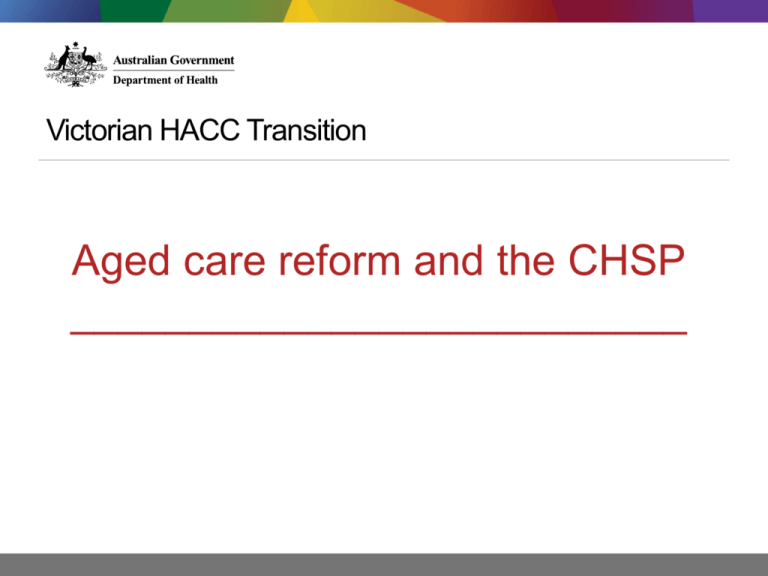
Victorian HACC Transition Aged care reform and the CHSP __________________________ Aged care reform Australians are living longer and healthier lives, so it is important that as people age, they can make choices about their care • Consumers’ expectations are also changing, with consumers wanting more say and control as to how services are delivered. • Broader reform agenda to move to a less regulated, more consumer- driven and market based aged care system. 2015 Victoria 2050 Victoria > 893,000 older people > 2.1 million older people Source: Victoria in Future, 2015 Aged Care reform - Overview • National Health Reform • HACC transfer to Commonwealth for all states/territories except Vic and WA • CHSP commences nationally – 1 July 2015 • Transition of Vic HACC for older people to the CHSP – 1 July 2016 • NDIS roll-out in Victoria - July 2016 to 2019 • Increasing Choice • Stage 1: February 2017 - Home Care Package funding follows the consumer • Stage 2: 2018 – intention to integrate Home Care Packages and the CHSP COMMONWEALTH HOME SUPPORT PROGRAMME (CHSP) Commonwealth Home Support Programme (CHSP) Commenced on 1 July 2015 • Brings together a range of programs to establish the entry tier of the aged care system: • Commonwealth HACC program (in all States except Vic and WA) • Assistance with Care & Housing for the Aged program • Planned respite from the National Respite for Carers program • Day Therapy Centres program • The CHSP will help frail, older people living in the community to maximise their independence. • The CHSP represents $1.6 billion in funding for 2015-16. CHSP Framework • Key documents: ─ CHSP programme manual ─ CHSP programme guidelines ─ Living well at home: CHSP good practice guide ─ CHSP Client contribution framework ─ Guide to the CHSP Client contribution framework. Key elements of the CHSP Many similarities to the Victorian HACC program: • Consistent assessment arrangements. • Focus on wellness and reablement. • Recognition for special needs groups. • Targeted sector support – volunteers, development officers. • No need to become an ‘approved provider’ under the Aged Care Act. • Payments in advance (no need to invoice). • Grant Agreement (Terms and Conditions). • Opportunities for growth funding. Benefits of the CHSP What does the CHSP mean for clients? What does the CHSP mean for providers? • Entry and a holistic, goal orientated assessment based through My Aged Care • Stability of funding for providers • Access to a wide range of entry level support services • Targeted sector support and development activities • Continuity of care and support • Reduced red tape for providers through streamlined funding arrangements • Delivery of services and support with a strong focus on wellness, reablement and restorative care • Streamlined and improved reporting through the DSS Data Exchange CHSP – Special Needs Groups The CHSP recognises the following special needs groups, which align with those identified under the Aged Care Act 1997: • People from Aboriginal and Torres Strait Islander communities • People from culturally and linguistically diverse backgrounds • People who live in rural and remote areas • People who are financially or socially disadvantaged • Veterans • People who are homeless, or at risk of becoming homeless • People who are lesbian, gay, bisexual, transgender and intersex • People who are care leavers • Parents separated from children by forced adoption or removal. Service Catalogue Programme Level Commonwealth Home Support Programme (CHSP) Service Level Community and Home Support Assistance with Care and Housing Care Relationships and Carer Support Service Type Level Allied Health and Therapy Services Goods, Equipment and Assistive Technology Home Maintenance Other Food Services Medical care aids Garden Maintenance Food Preparation in the Home Reading aids Major Home Maintenance and Repairs Transport Social Support Individual Domestic Assistance Meals Personal Care Social Support Group Home Modifications Nursing Specialised Support Services Assistance with Care and Housing Flexible Respite Centrebased Respite Cottage Respite Assistance with self-care Social Support - Group Home modifications Nursing Continence Advisory Services Assessment Referrals In-home Day Respite Residential Day Respite Overnight Community Respite Dementia Advisory Services Advocacy – Financial, Legal Host Family Day Respite Centre Based Day Respite In-home Overnight Respite Community Access - Group Service Sub-type Level Podiatry Direct (driver is volunteer or worker) Social Work Speech Pathology Dietitian or Nutritionist Self-care aids Support and mobility aids ATSI Health Worker Other goods and equipment Diversional Therapy Physiotherapy Psychologist Exercise Physiologist Car modification Communication aids Minor Home Maintenance and Repairs Food Advice, Lessons, Training, Food Safety Indirect (through vouchers or subsidies) Visiting Telephone/ Web Contact Accompanied Activities, e.g. Shopping General House Cleaning At Home At Centre Linen services Unaccompanied Shopping (delivered to home) Assistance with client selfadministration of medicine Vision Services Hearing Services Host Family Overnight Respite Other Support Services Mobile Respite Client Advocacy Other planned Respite Community Access Individual Respite Occupational Therapy Ongoing Allied Health and Therapy Services Restorative Care Services Other Allied Health and Therapy Services As at 20 July 2015 CHSP - Community & Home Support Covers the majority of Victorian HACC services - Domestic assistance - Personal care - Allied health & therapy services - Social support (individual) - Goods, equipment & assistive tech - Social support (group) - Home maintenance - Other food services - Home modifications - Nursing - Transport - Meals • Provides entry-level support to assist older people to live independently at home and in the community. CHSP – Care Relationships & Carer Support Merges 12 respite services into three - Flexible respite (e.g., in home day/overnight respite, host home day/overnight respite, mobile respite) - Centre-based respite (e.g., residential day respite, centre-based day respite) - Cottage respite (e.g., overnight community) • Recognises the integral role carers play in ensuring quality of life and independence for older people. • Caters for some grandfathering of young clients (existing only), until more appropriate services become available. CHSP – Assistance with Care & Housing Includes former ACHA services - Assessment – referrals etc. - Advocacy – financial, legal etc. • Supports vulnerable clients to remain in the community through accessing housing and supports. • Target group is people aged 50 years and over, who are on a low income and are homeless or at risk of homelessness. CHSP – Service System Development Similar to activities funded as HACC Service System Resourcing • Supports the development of the community aged care service system in a way that meets the aims of the programme and broader aged care system. • Covers a range of activities that are designed to support, develop and build the capacity of the service system and the sector. • This service type does not include provision of direct service delivery to clients or advocacy. WHAT THE TRANSITION MEANS FOR YOU Transition of Victorian HACC services No change before 1 July 2016 - business as usual • From 1 July 2016 - change in level of government that funds services as HACC services are split based on age: ─ Commonwealth: services for older people. ─ Victorian State Government: services for younger people, until such time as they transition to the NDIS. • Existing HACC service providers will be offered the same funding they currently receive - no competitive tendering. • Ongoing services and projects that support and strengthen service provision in the HACC sector will be funded. What the transition means for clients Services continue to be delivered after 1 July 2016 • You will still provide community care services to consumers. • The people you help will still get care from you, no matter what their age. • Special needs groups will remain including: ─ CALD communities ─ People living in remote or isolated areas ─ Aboriginal and Torres Strait Islander people. • Changes are about who funds services, not who can access services. Further information • CHSP programme documentation on the DSS website www.dss.gov.au/CHSP ─ CHSP programme manual ─ CHSP latest news and fact sheets. • Check out the webinars available on the DSS website. • Sign up for the Home Care Today newsletter. THANK YOU


